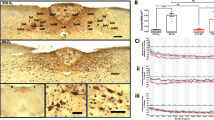Abstract.
The role of the ventral striatopallidal pathway and related cortical areas in stimulus-reward association reversal behavior was studied by inducing bilateral lesions with the excitotoxin, N-methyl-d-aspartate (NMDA) at restricted sites in the system. The areas lesioned were the ventral pallidum (VP), the ventral striatum (VS), the medial prefrontal cortex (mPFC) [i.e., the prelimbic (PL) and infralimbic (IL) cortexes], and the orbital cortex [i.e., the dorsolateral orbital (DLO), ventral lateral orbital (VLO), and lateral orbital (LO) cortexes]. Rats with lesions of the dorsal caudate nucleus and putamen (CPu) served as a positive control in this study. Water-deprived rats were trained on a go, no-go two-odor olfactory discrimination task to respond to one odor (S+) with water as a reward and to suppress responding to the other odor (S–). The rats were then tested for their ability to reverse the associated stimuli. The number of errors made before successfully learning the stimulus-reward association were measured in relation to a sham lesion control group which did not receive injections of NMDA. In experimental rats, the lesions did not affect their ability to learn stimulus-reward associations for novel odors, but did result in an increase in the number of false alarms after the significance of the associated stimuli were reversed. That is, the lesioned animals persisted in responding to the formerly rewarded but now unrewarded stimulus. Rats with damage to the CPu did not show a significant effect when compared with the controls during reversal problems. The results support the hypothesis that the ventral striatopallidal system, together with related thalamic and frontal cortical structures, functions in reversal learning by suppressing inappropriate responses to stimuli that are no longer rewarded.
Similar content being viewed by others
Author information
Authors and Affiliations
Additional information
Electronic Publication
Rights and permissions
About this article
Cite this article
Ferry, A., Lu, XC. & Price, J. Effects of excitotoxic lesions in the ventral striatopallidal–thalamocortical pathway on odor reversal learning: inability to extinguish an incorrect response. Exp Brain Res 131, 320–335 (2000). https://doi.org/10.1007/s002219900240
Received:
Accepted:
Issue Date:
DOI: https://doi.org/10.1007/s002219900240




